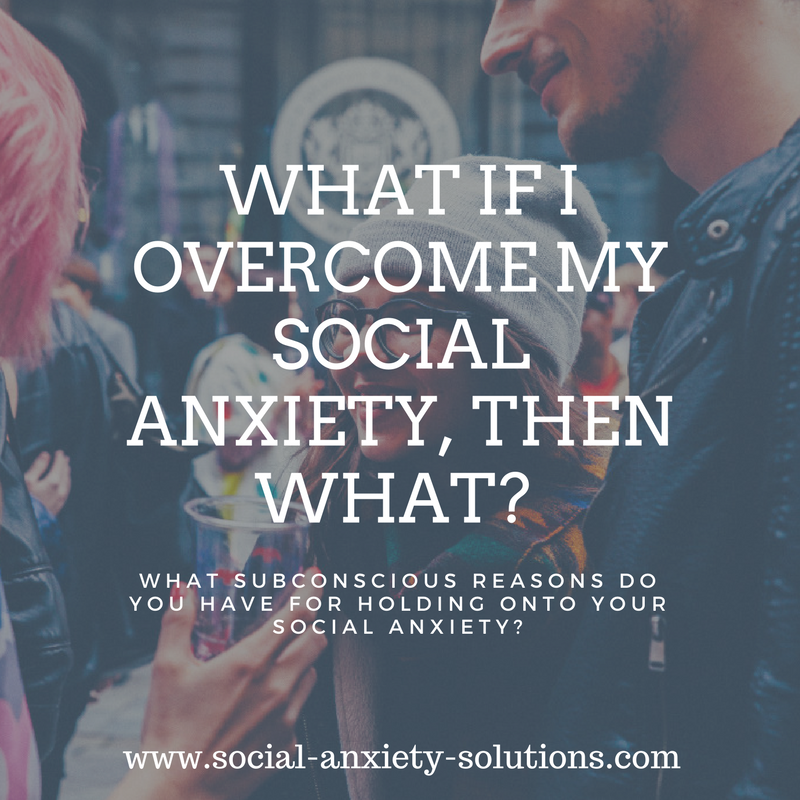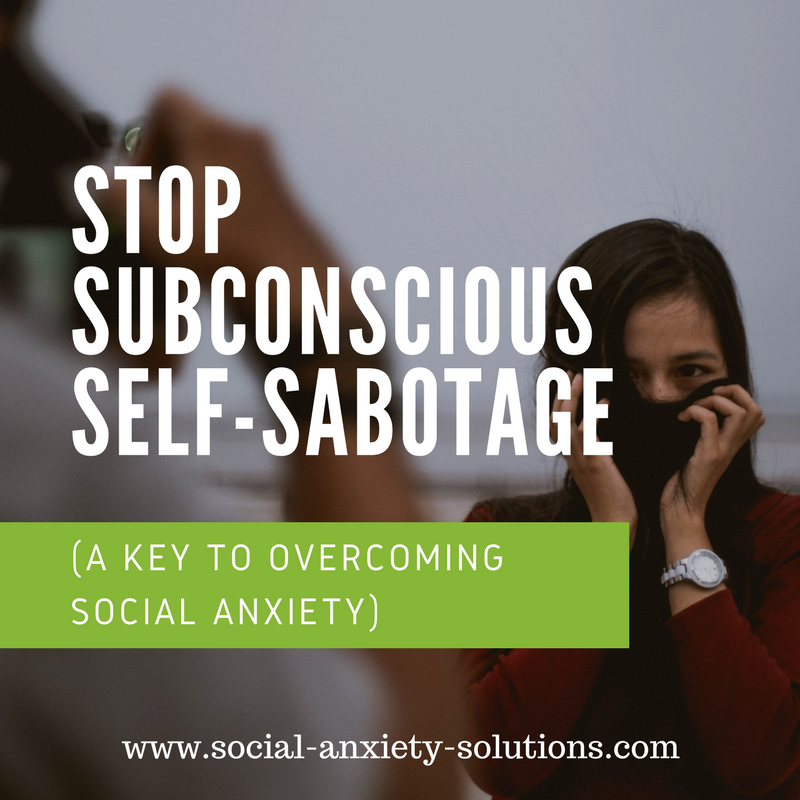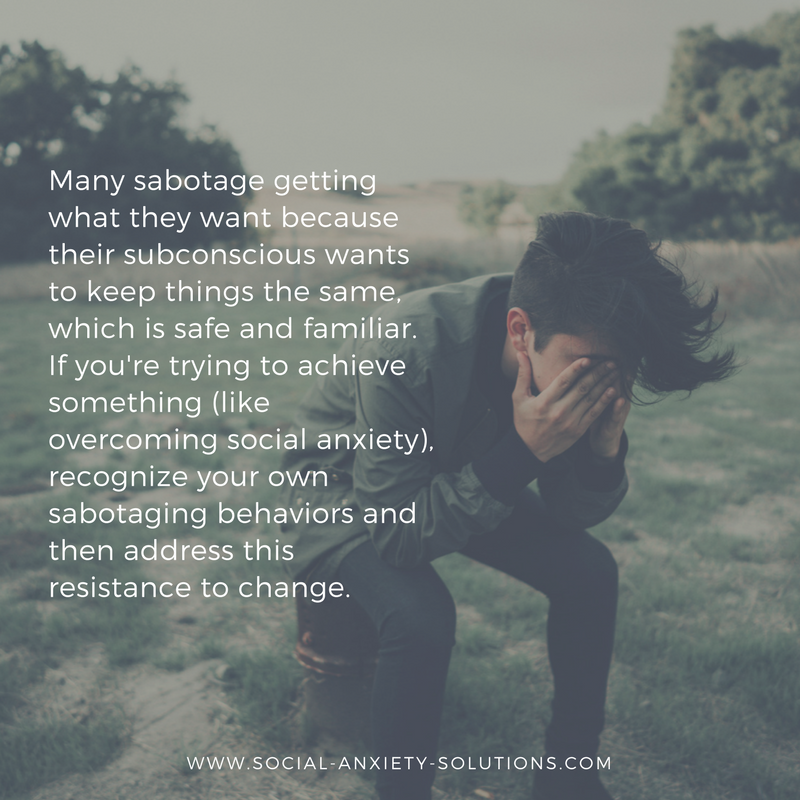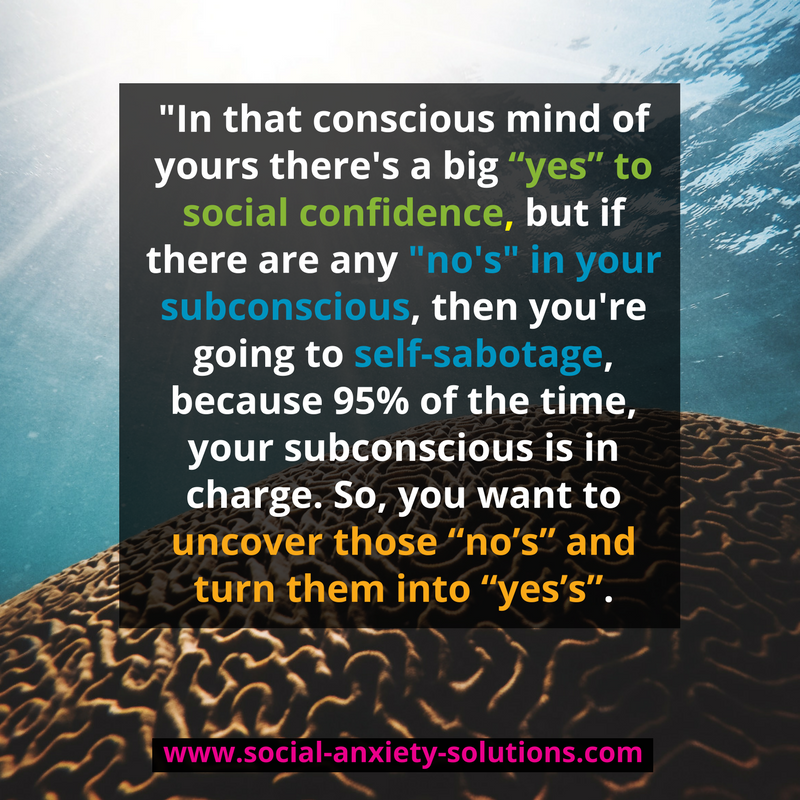SUMMARY
In this post, I share how you may be getting in your own way of overcoming social anxiety.
Why you may be unknowingly self-sabotaging progress on your journey to social confidence…
… I’ll give you one of the keys to overcoming social anxiety so you can learn how to break this self-sabotage cycle.
Here are some things I’ll cover:
- Social anxiety is a complex problem
- How to spot your self-sabotaging patterns
- Recognize if you’re not 100% yes to overcoming social anxiety
- Stop subconscious self-sabotage (aka getting in your own way)
- Ask yourself what will happen if you overcome social anxiety
There is fear of the unknown and fear of what you don’t want to face, but the very things you fear may be the very keys to you finally becoming 100% yes to overcoming your social anxiety and making it a reality.




FULL TRANSCRIPTION
Sebastiaan: Hello this is Sebastiaan from social-anxiety-solutions.com. I am a social confidence coach and ex-social anxiety disorder sufferer and I help people with social anxiety feel calm and relaxed in social situations. And I do that by combining the best of traditional psychology and Eastern energy psychology. If you don’t know what an Eastern psychology is google it. You know, it’s an umbrella term for techniques like EFT.
And EFT stands for Emotional Freedom Techniques. It is psychological form of acupuncture but instead of using needles you tip with the tips of your fingers at specific acupressure points on the body.
Now while you do that when you’re focusing on a particular negative emotion that is excessive or dysfunctional the tapping is gonna calm that down. It sends signals to the part of your brain called the amygdala which is your early warning system. And studies have shown that it releases it reduces the production of cortisol and it increases the production of serotonin. Cortisol is your stress hormone and serotonin your happy hormone. And these biochemical responses create a sense of calm so you’re focusing on the problem due to tapping and emotions connected to the problem that are excessive in this function will start to dissolve so that you get back to the present.
And that’s one of the amazing techniques that you can use in order to actually get rid of your social anxiety, neutralize it so you do not have it anymore in your life.
Now, it unfortunately isn’t as easy as that because while the tapping is effective like that, social anxiety tends to be, in my experience having done this for nine years as a coach eight and a half, but you know let’s round it up. In my experience, it tends to be a complex issue and the tapping needs to be addressed to many, many aspects of the problem and within the process of our overcoming your social anxiety there are a couple of keys that need to be addressed and one key I want to talk about today and that key is overcoming your subconscious resistance to change, your subconscious resistance to letting go of your anxiety.
And you might say, “Well, what the hell? You know, I want to get rid of this anxiety. It sucks, it bothers me, it limits me. I can’t be myself socially. I can’t make eye contact properly you know I freeze up, I can’t speak. There’s a lump in my throat…my heart starts to race…my stomach gets upset…I start to sweat.” Whatever it is for you.
You know, I know it’s limiting you but that’s your conscious desire. You know, you have a conscious mind and you have a subconscious mind and your conscious mind is about as in charge about 5% of the day and your subconscious mind is in charge 95% of the day. So, if you consciously want to overcome your social anxiety that’s great but if 95% of you, you know, if your subconscious is a no to you overcoming your social anxiety and your subconscious is in charge 95% of the day which it is, guess what’s gonna happen? You might be able to make some changes, but the changes won’t last if you’re even able to make changes, because when the subconscious is resistant to you wanting to achieve something consciously it’s gonna sabotage you.
How to spot if you are self-sabotaging
Well, how do you know you’re dealing with sabotage?
You just feel tired when you’re about to you know, do some things to overcome your social anxiety or you are working on the wrong things at the wrong time or you know you keep postponing or long pause I should think of something else now. What else does it do? It makes you lose focus. You know come up with plans and then and then not act on them you know procrastinate. A wide variety of things and those things are actually like evidence that you’re not a hundred percent “yes” to making that change.
You know, I can remember I will make all these plans to overcome my social anxiety but then when it will come to it am I too tired well I’ll just do it next time you know or you know, let me just first watch this TV program or let me read this thing first or you know I haven’t prepared enough yet or that won’t work for me anyway or whatever like all of that it’s this part of your subconscious sabotaging you to take the right action in order to overcome your social anxiety.
So, even we have a tool like tapping if you don’t overcome the subconscious resistance to change you will either only get temporary results or you won’t be able to make changes at all.
Now when you’re doing your tapping so when you’re doing this EFT you’ll know that you’ll have resistance, because the intensity is not dropping anymore. So you focus on something and you do your tapping and what normally happens in most cases when there is no resistance your intensity starts to drop, starts to drop, start to drop, starts to drop. But if it’s not dropping, in most cases, is like there’s resistance to letting go of it.
Recognize if you are not 100% yes to overcoming social anxiety
Now this when I found out about this was quite revelatory to me. By then I already started working with clients it was an early, early stages. Maybe my first two clients or something and I would work with them and in the whole EFT tapping world the common understanding is you tuned into a feeling you asked yourself what that feeling reminds you of that feeling reminds you of an earlier experience in life somewhere in your childhood most likely. That’s where the origin of that feeling comes from and it just gets read triggered in the here and now over and over and over.
So, you go back to that childhood experience, you clear it up and then you go back to that original feeling that you were working on and then you’ll find it like hey it’s not bothering as much anymore, or it doesn’t bother me anymore at all. The feeling is neutralized because the origin of the feeling has been cleared.
But I was working with clients and I found that I was clearing like event after event after event after event, and the guy ended up being just as anxious as you know as always even though he was making progress. Like the end of a coaching session he’d say so great I feel much more confident blah blah and then it would come back. I’m like, “So, how was your week?” He’s like “Yeah, same. Nothing changed”.
And so, in frustration I’m of course looking for why is that. So, I’m studying all the EFT masters out there and eventually I ran into Lindsay Kenney one of the EFT masters and I’ve since studied with her a lot and I know her work that’s great and I highly recommend it, pro EFT. And she talked about subconscious… no, she talked about us that there are different kind of reversals. It’s a bit of you know EFT jargon but basically a reversal is when your energy is not flowing in the right way and no amount of tapping or any kind of technique or strategy to change will work.
And so, you reversed your energies reversed nothing works. And one of the reversals she calls secondary benefit syndrome and what it is. I just call a subconscious resistance which it is, is where one part of you wants to be socially confident and another part of you wants to stay socially anxious for reason XYZ. And when I read about that was like wow that’s an amazing insight and when I started using it with my clients now they actually started to get rid of their anxiety.
I have another example of a girl that I work with she said “I’ve never been able to get rid of this anxious feeling in my solar plexus. No amount of tapping has ever done it”. And so, I work with her I’m like, “Okay, well, clearly you have resistance to letting go of that anxiety in your chest so just tap here and just repeat after me – Even though part of me doesn’t want to let go of this anxiety, maybe it’s not safe, maybe you don’t deserve it, maybe it’s part of who I am, I want to try to accept myself”. Anyway, we would do that and which neutralizes the resistance, we do the tapping and she’s like, “Oh, my God, it’s gone, this is amazing and blah, blah, blah.” And that’s a very common experience.
How to stop subconscious self-sabotage (aka getting in your own way)
So, that is a very important key to overcoming your social anxiety because if there… See it like this, you know, you have your conscious mind say that this is your conscious mind and you have your subconscious mind, it might be a bubble under underneath here. So, in that conscious mind of yours there’s a big “yes” to social confidence but if in the subconscious there is a “no” or there are several no’s then you know, consciously you want to go to social confidence. Say that social confidence is here but subconsciously you’re not gonna go there because 95% of the time it’s in charge. So, you might go there a bit but then the subconscious goes back. You might go there a bit but this subconscious just pulls you back
So, you want to uncover those “no’s” and turn those “no’s” into “Yes’s”.
So, what might be an example of “no”, well, common one is it’s not safe to be free of my social anxiety, I don’t deserve to let go of my social anxiety or there might be like well, if I let go of my social anxiety then there will be a lot more pressure on me and I won’t be able to handle that, or I don’t want to deal with that. And often that’s not a conscious choice, but that’s somewhere in your subconscious. And so, that needs to be addressed and it can be addressed with tapping. It takes a bit of persistence, it takes a bit of work but it’s not difficult.
And to deepen your understanding about subconscious resistance some more I’m actually gonna read to you one of the… I’m not sure if it’s the original article I doubt it actually but because that’s a long time ago but and I don’t know how old this article is. Anyway, I’m gonna read to you part of the article from Lindsay Kenney about secondary benefits syndrome because she gives an example of women who want to lose weight who are dealing with the subconscious resistance to letting go and keeping off the weight. And when you I think when you see with a different condition than social anxiety it starts to make more sense to you.
Now I’ll come back to this in more detail later but here we go. Alright, so, here’s my reading.
The second type of reversal I call SBS or Secondary Benefit Syndrome. This type of a reversal occurs when the subconscious mind perceives that it is better or safer to keep an issue like negative emotions, chronic pain, extra weight or a bad habit rather than to eliminated and we can include social anxiety there. Since this is seldom a conscious choice most people will initially disagree with you if you tell them that they actually want to keep their problem or issue.
Of course, they don’t consciously want to stay emotionally or physically in pain but the subconscious is a powerful entity usually exhibiting dominance over our conscious desires. You know, except four to 5% of the time. An example that’s easy for most people to understand is the secondary benefit syndrome for people with weight issues. Even though consciously someone may desperately want to lose that extra 50 pounds their subconscious may be thinking otherwise and here are some examples of what the subconscious might be thinking:
“What if I lose the weight”… And this is the subconscious thinking. “What if I lose the weight and I still don’t get that promotion I want? What if I lose the way then I still don’t have many friends? What if I lose the weight and I’m still not pretty? What if I lose the weight and I’ll be so pretty then I might get raped again? What if I lose the weight and now feel the prize of all the foods I love? What if I lose the weight and I still don’t find the relationship that I yearned for? What if I lose the weight and my chubby friends start resenting me? What if I lose the weight to my clothes won’t fit and I can’t afford a new wardrobe? What if I lose the weight and my skin gets all saggy? What if I lose the weight and I’ll get too much attention? What if I lose the weight and my life still sucks?
For someone who has carried around extra weight to trauma, chronic pain or a phobia for years it becomes a part of his or her personality or even his or her identity. To lose the problem could to their non-your subconscious mind be very threatening. For instance, and here we go – “If I get over this issue I won’t have an excuse anymore for my life not working or if I get over this issue I may not know who I am anymore. If I get over this issue I won’t know how to act as a functional non-victim person. What if I get over this issue and I won’t get the attention or sympathy that I get now?”
[su_spacer size=”10″
Alright, we’ll cut it off there. I’ll ask Rachel to link this below this video, so you can read the full article.
(To see the full article go to: www.emofree.com/articles-ideas/general-ideas/psychological-reversal-article.html)
What if I overcome my social anxiety, then what?
But see how you can relate to that you know. If I get over my social anxiety then what? You know, what might be a consequence for you? What might be downside of it? You know, will there be higher expectations on you? What will you have to do that you don’t want to do?
Now what might be problematic if social anxiety is no longer a thing in your life you know? And sometimes this is just one thing and it’s pretty easy to turn around and sometimes it’s a whole bunch of thing. So, it’s a whole bunch of “no’s” in your subconscious and all of them need to be turn around to “yes’s”. And you know, common thing for people as well as like, “Well, who am I gonna be when I no longer have this social anxiety? You know, I think about it all the time, it’s obsessed, it’s obsessive, I can’t get it off my out of my mind. What am I gonna think about then? Who am I gonna be? How am I gonna act? What’s gonna happen?”
You know, there’s the fear of the unknown and subconscious wants to keep things the same, wants to keep things as they are because you know, you can keep control. That’s another one, a big one – “What if I lose control when I don’t have social anxiety? What if it’s gone and it will come back?”
So, I’ve talked about this before, I’ve talked about it now again and I will talk about it in the future in a lot more detail or a lot clearer examples, but I just wanted to talk about this key to overcoming social anxiety today.
Now if you have any questions about this post them in the video below and if you don’t have yet have my social confidence starter kit where I teach you the tapping in a bit more detail and you’re not on my e-mail list yet where I talk about subconscious resistance with examples from clients, former clients, go to my website social-anxiety-solutions.com click on overcome social anxiety and you can get it there for free. Twelve videos, I guide you through it, teach you some amazing things and go there or click on the link below this video. Man, it’s gonna be a lot of links.
Alright. So, I hope that’s been helpful. Like I said I’ll be talking about this key in a lot more detail soon. There’s some very exciting stuff coming up if I can actually finally finish this project but thanks for watching, hit the subscribe button here or here or here or wherever it is. Spread the news if you can I would appreciate it. This is very weird, and out their stuff compared to the you know, to the western traditional stuff that is out there. And thank you, I will talk to you next Thursday for the next video. Bye for now.
If you experience Social Anxiety, click below to receive the FREE “7 Secrets to Social Confidence” Mini Course!
- How To Stop Worrying - January 17, 2024
- How to Reduce Facial Blushing with EFT Tapping? - June 29, 2023
- Are You Scared to Get Anxious? Here’s how to fix it! - June 16, 2023


